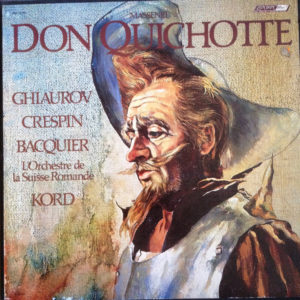
Opera Profile: Massenet’s ‘Don Quichotte’
By Logan MartellFirst premiering at the Opera de Monte-Carlo on February 19, 1910, “Don Quichotte” is one of many adaptations drawing from Cervantes’ classic novel.
Although prominent figures, such as Purcell and Strauss, have composed music to accompany performances of the famous tale, it is Massenet’s “Don Quichotte” that has enjoyed lasting success over the years. The work was composed at towards the end of Massenet’s life, as he found himself often bedridden due to rheumatism. The title role was written with Russian bass Feodor Chaliapin in mind, and he would go on to give acclaimed performances as the starry-eyed knight.
Short Plot Summary
Outside of Dulcinee’s home, four suitors sing and pitch woo to the admired beauty. As she elaborates that she desires more than to simply be desired, a gathering of peasants announce the arrival of Don Quichotte, an erratic knight, and his squire Sancho. When Don Quichotte tries his hand at serenading Dulcinee, he catches the ire of Juan, another suitor for her hand. Dulcinee dismisses Juan after a brief swordfight between the two men; when Don Quichotte promises her his heart along with a castle, she suggests for him to retrieve a pearl necklace that was stolen by the bandit leader Tenebrun. Don Quichotte gladly accepts and rides off. One misty morning, as the two adventurers ride forth on their steeds, Don Quichotte is composing a love song to Dulcinee, prompting Sancho to sing of the perils not only held by their quest, but by women as a whole. As the mists fade, the gradually-appearing line of windmills on the horizon is mistaken for an army of giants by Don Quichotte. The old knight gallantly charges down one of his foes, and soon finds himself dangling from one of the arms as it spins in the air.
Don Quichotte and Sancho make camp after reaching the mountains, the former standing guard while the latter gets some sleep. The bandits spring upon them and after a short fight, take the knight prisoner while Sancho manages to escape. Though the bandits first intend to kill Don Quichotte for the trouble he has given them, they are soon won over when he sings a prayer unto God begging safe passage for his soul to enter heaven. When he explains his purpose in seeking out the bandits, they return the pearl necklace, and even request him to bless their group before he departs. Don Quichotte and Sancho reunite, and arrive at Dulcinee’s house during a dinner party. Sancho asks his master for the reward his services merit, and Don Quichotte assures him that he will receive riches, a castle, and his own island. When it comes time for Don Quichotte to return Dulcinee’s necklace, she is grateful, but when he follows up by asking for her hand in marriage, she and the gathered party laugh at his request. Dulcinee’s heart is quickly moved to pity, however, and she orders the guests out so that she may explain to Don Quichotte her outlook on life and love, one that she claims is greatly different than his own. She instead rewards him with a kiss upon the forehead, and Sancho takes the old knight home as the guests return to mock him. Some time later, Don Quichotte lies in bed; his broken heart has robbed him of the will to live. As he shares his last thoughts with Sancho, he recalls the promises he made his squire, and offers to him an island of dreams as recompense for his services. As his final hour draws to an end, Don Quichotte observes a star shining overhead; hearing the voice of Dulcinee calling from heaven, the knight casts off his soul to begin his journey in the next life, leaving Sancho to cry over his body.
Watch and Listen
Check out Samuel Ramey’s famed interpretation in the Massenet opera.
Categories
Opera Wiki

